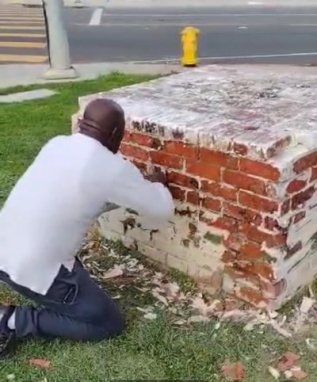Photo: former SDSU and NFL football star Neal Petties today.
February 18, 2022 (San Diego) - A potluck gathering Saturday afternoon at Mountain View Park will commemorate Black History Month, but it’s also a celebration of the 11-acre park’s historic importance to the Black community in San Diego.
The park’s history begins in 1894 when the land was purchased by the city of San Diego and later dedicated as a park in 1914.
 Photo, right: Jeffrey Hayes cleans the base of the “Black Family” statue.
Photo, right: Jeffrey Hayes cleans the base of the “Black Family” statue. J.W. August is an award-winning journalist and freelance producer who has served as investigative producer for NBC 7 San Diego and as managing editor and senior investigative producer at ABC 10 San Diego. His in-depth investigations have included a wide range of topics such as rising seas, hate groups, nuclear fuel storage, stem cell clinic claims, dolphin deaths, and massage parlors as fronts for organized crime.
J.W. August is an award-winning journalist and freelance producer who has served as investigative producer for NBC 7 San Diego and as managing editor and senior investigative producer at ABC 10 San Diego. His in-depth investigations have included a wide range of topics such as rising seas, hate groups, nuclear fuel storage, stem cell clinic claims, dolphin deaths, and massage parlors as fronts for organized crime.His 40-year career includes many honors, notably 35 Emmy awards from the National Academy of Television Arts and Sciences, the National Press Club award for consumer reporting, the Freedom Foundation award for coverage of hate groups along the border, the National Society of Professional Journalists’ Sunshine Award for fostering open government in San Diego, and the Investigative Reporters and Editors award for outstanding investigative reporting on illegal waste dumping.
August is past president of the Society of Professional Journalist’ San Diego Chapter , as well as past president of Californians Aware, a public interest group devoted to helping the press and public hold public officials accountable for their actions. He is also an adjunct professor at Point Loma Nazarene University, teaching investigative skills and long-form storytelling to aspiring future journalists.

 Reprinted with permission from J.W. August, Times of San Diego, a member of the San Diego Online News Association
Reprinted with permission from J.W. August, Times of San Diego, a member of the San Diego Online News Association





Recent comments